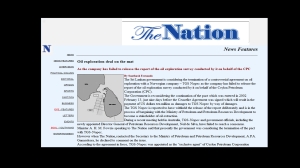In Sri Lanka there is oil. And it was an old and very well known fact. Petroleum exploration began in the ’60’s and after that especially the Soviets undertook several geological surveys from 1972 to 1975. After that a Canadian company acquired seismic data in 1984.
Then the war broke out, leaving everything dormant(source: the Minister of Petroleum Resource Development Secretariat, PRDS)1.
In fact the areas interested are offshore the coast controlled by the LTTE; moreover the separatist group had an extraordinary navy force, agile, well-trained, with perfect knowledge of the surroundings. The so called Sea Tigers were a crucial element of the strategic survival: the supply line was coming through the sea; thus for the LTTE was a priority to maintain a capable navy, which indeed was able to face up the Sri Lankan one.
In the ’80s technology and low prices made it uninteresting to search for oil. But in the 2000s, technology improved immensely in the field, countries like Brazil or Norway became expert in working in such conditions. The thirst for natural resources driven by China sparked a global race to exploit even secondary fields. And price went up.
Norway’s interest in particular focused on Sri Lanka; in fact they developed an expertise for those geological conditions. So it was nothing but natural that a Norwegian company begun to work in Sri Lanka. TGS-Nopec started started seismic survey in the Mannar Basin (source: PRDS2). In December 2001, the company delineated a “major, unexplored Jurassi-Creataceous continental rift basin. Large structures, thick turbidite sequences and numerous direct hydrocarbon indicators have encouraged TGS-Nopec and CPC to now propose to the industry a major Phase II program” (source: TGS Nopec press release)3.
From 2002 to 2005 the company continued to acquired data about the potential of the Mannar Basin(source: PRDS) 4.
From the enthusiasm expressed in public we can argue that the company felt of being close to a major discovery. But suddenly on the 3rd of March, 2006, President Rajapakse spread the voice he wanted to stop the collaboration with TGS Nopec5. This produced a very odd case: the government of Sri Lanka had given concession rights to the company, but it rushed so badly, that it was in breach of the contract. At the time many didn’t understand why Sri Lanka should pay to re-acquire rights on its own land6.

Opinions about the breach of contract with TGS-Nopec.
From http://www.nation.lk
It should have been the other way round. Instead the government of Sri Lanka agreed to pay 10.5 USD in compensation 7. In the 2001 agreement, TGS Nopec had the right to sell to third parties its data. Sri Lanka wanted to rescind the contract and accepted to pay the termination fee. It seemed like a very odd behavior, given the information available in public at the time. You can assume that Colombo was crazy in terminating a collaboration with a long-standing partner if they weren’t sure. Or you can assume that confidential information was more convincing that the public one. Later on oil was actually found. So either Sri Lanka had gambled and won. Or they knew it for sure since then. These events happened in 2006. If you have some interest in the Sri Lankan civil war, this year should ring a bell.
More to come, stay tuned.




